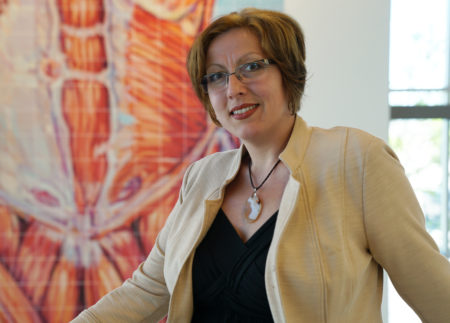 Dr. Gergana “Geri” Deevska serves as Assistant Professor of Biochemistry at the Idaho College of Osteopathic Medicine.
Dr. Gergana “Geri” Deevska serves as Assistant Professor of Biochemistry at the Idaho College of Osteopathic Medicine.
Dr. Deevska received an M.Sc. in Molecular Biology from Sofia University and a Ph.D. in Biochemistry from the Bulgarian Academy of Sciences. She then completed her postdoctoral training in the area of lipid metabolism and signaling in the Department of Physiology at the University of Kentucky’s College of Medicine.
Prior to joining ICOM, Dr. Deevska served as a dual-appointed faculty member at the Kentucky Colleges of Osteopathic Medicine and Optometry where she taught medical biochemistry, genetics, and biochemical nutrition for two years. During that time, she worked on establishing an active research program focused on the role of bioactive lipids in obesity-associated pathologies.
Throughout her postdoctoral work and faculty appointments, Dr. Deevska participated in the training and mentoring of more than 15 undergraduate, graduate and medical students, junior post doctorates and staff members. She believes that students’ involvement in basic science research builds a strong foundation for success in medicine.
Dr. Deevska is actively engaged with the American Society for Biochemistry and Molecular Biology’s (ASBMB) initiatives in the areas of instruction and assessment and serves as editor and ad-hoc reviewer for several scientific journals.
Q: What inspired you to pursue a career in biochemistry?
A: The human body, at its most fundamental level of organization, is a unique compilation of hundreds of thousands of different molecules that all work together in a highly-organized and elegantly-regulated manner to maintain a healthy state. Biochemistry is focused on studying the structure-function relationships between these molecules, how they interact with one another and change through chemical reactions within the cells, and how these changes are regulated. When something in the molecular machinery stops working, it ultimately leads to a disease. Understanding these intimate relationships and deciphering the mechanisms of regulation at the molecular level is crucial to explaining what went wrong and why, and provides a foundation for searching for the best treatment targets and finding a cure. This is what initially drove me to the field of biochemistry and I committed my career to the search for answers that will not only fill our gaps knowledge, but will open possible avenues for development of novel treatments. Being able to share my knowledge and experience with my students and helping them self-discover the magical world of molecules and biochemical reactions that underlie the self-regulation, self-healing and health maintenance properties of the human body is what keeps me excited about my everyday work.
Q: What inspired you to work at ICOM?
A: Coming to ICOM felt like a mission, not just another faculty job for me. Being part of building the first ever medical school in Idaho, developing an innovative curriculum that is unique and student-focused, creating a culture of teamwork, inclusiveness, collegiality and respect was one-of-a-kind opportunity that does not present often in life.
Q: What is a memorable research project you’ve worked on?
A: Every research project I’ve been involved in feels special to me because there have been countless hours spent in experimental work, sleepless nights, tons of reading and writing, and re-reading and re-writing and, most importantly, always learning something new and always asking new questions. The most memorable one is probably my postdoctoral research project focused on investigating novel mechanisms underlying the development of fatty liver disease. The project evolved as a continuation of my graduate research and was awarded a highly competitive postdoctoral award from the American Heart Association. This project uncovered the existence of previously unknown relationship between two different lipid metabolic pathways and suggested possible new molecular targets for treatment of fatty liver disease.
Q: What is the best part of your job?
A: The best part of my job is being able to witness the phenomenal transformation that every student undergoes during the 4 years spent in medical school. Seeing the spark in a student’s eyes when they’ve learned something new or understood a difficult concept or completed their first-ever successful experiment in the lab is something that makes my day shine. It is a privilege to be able to contribute to someone’s own personal and professional growth into becoming a confident, competent and successful physician that is ready to face the world, take care of the sick and save lives.
Q: What advice do you have for ICOM’s student doctors as they prepare to become physicians?
A: Something interesting that I learned last year during a conference session discussing the implication of Self-Regulated Learning (SRL) theory to assess and remediate struggling learners is that the struggling medical students seem to stay focused on the goal (course grade, passing an exam, etc.) whereas successful medical students keep their attention on the process that results in achieving this goal (studying, learning, practicing a skill). In medical school, you are no longer studying to just pass a test or achieve a better grade in a course, you are studying to be able to best serve your future patients. Every single piece of information is important and in one way or another, shapes you into the physician you will one day become. Stay focused on the learning process, be humble and never give up on your dreams.